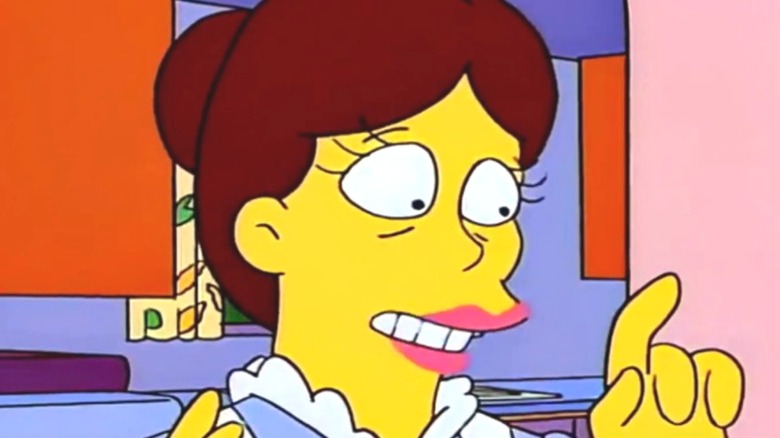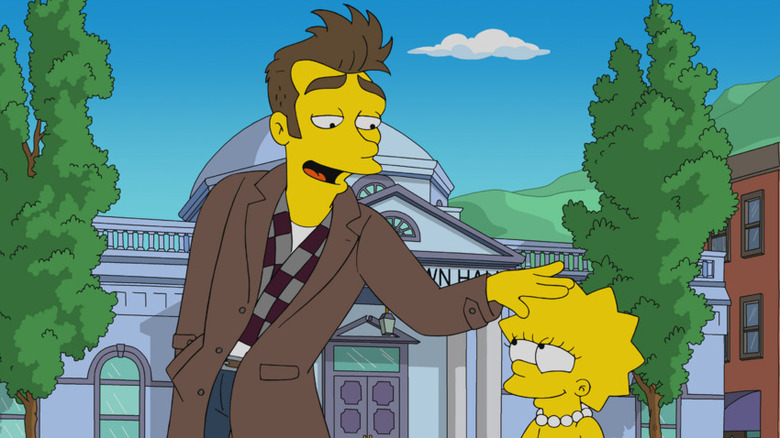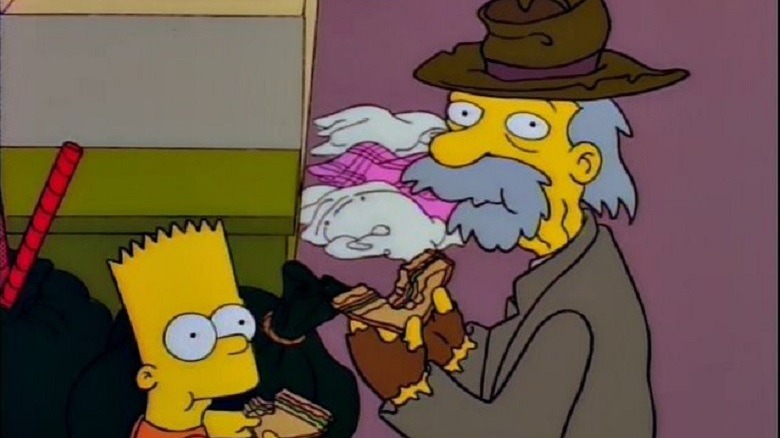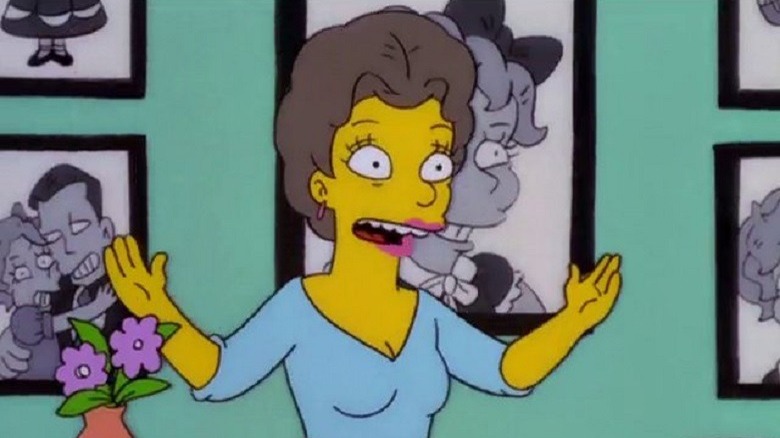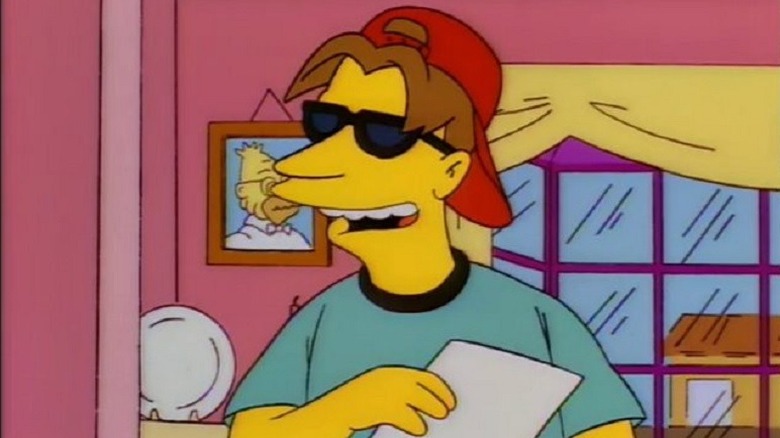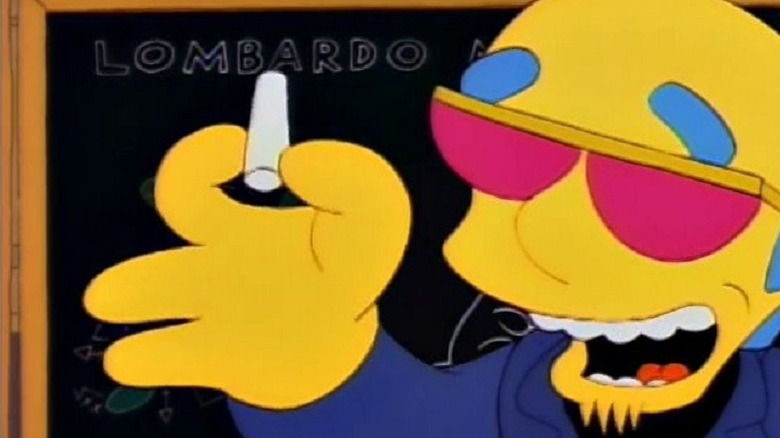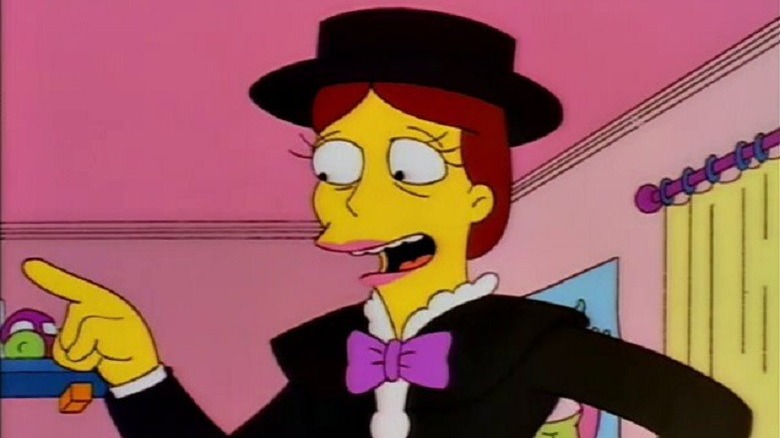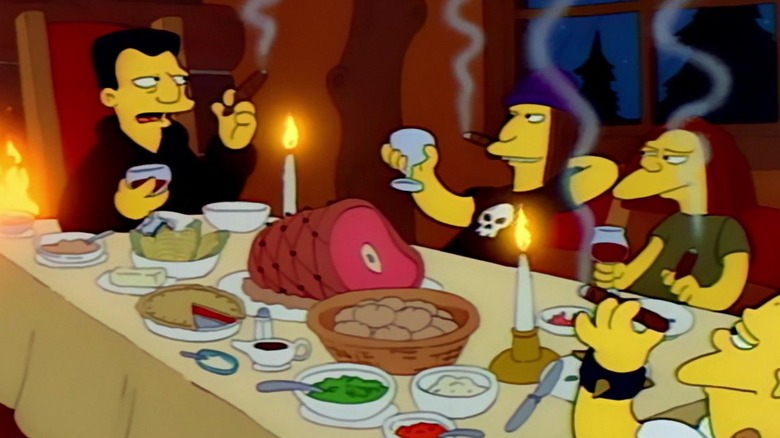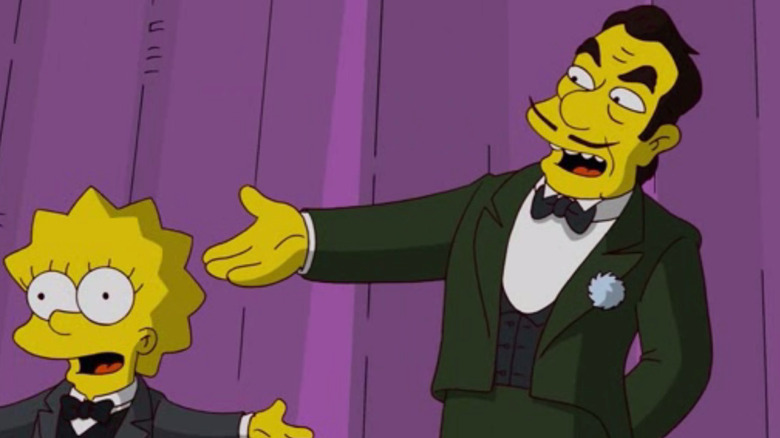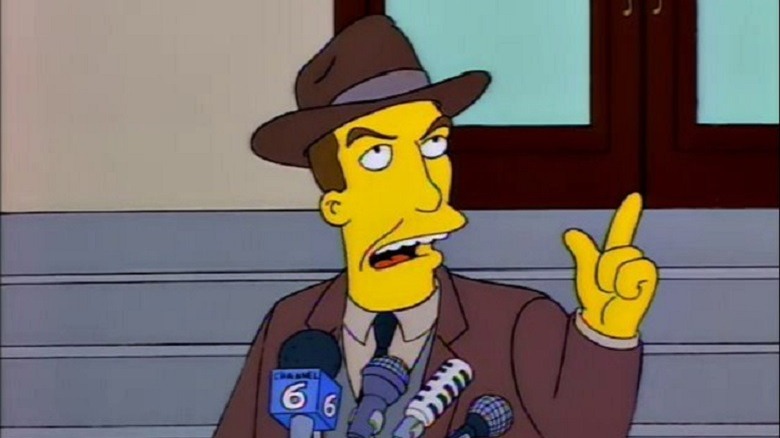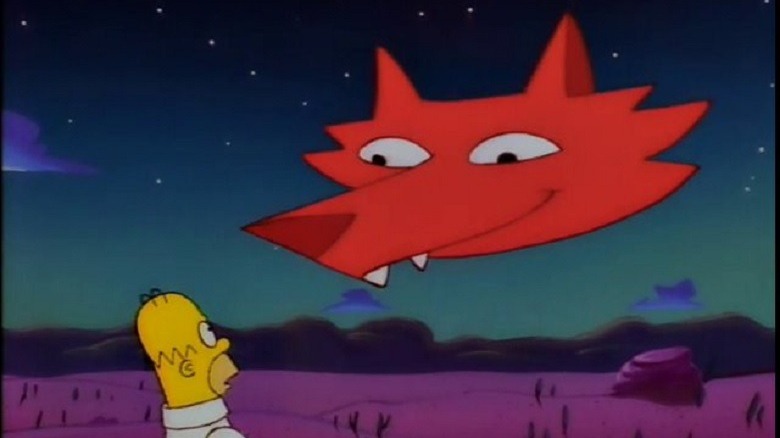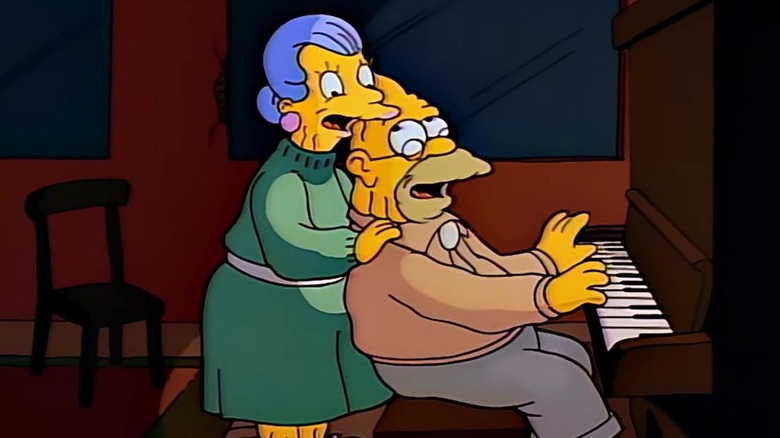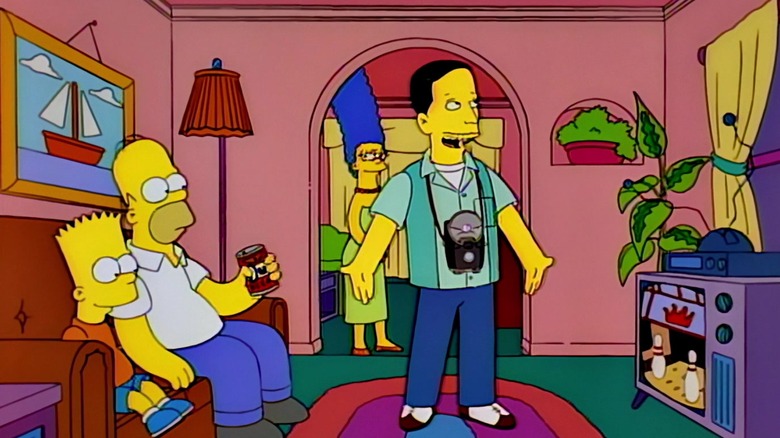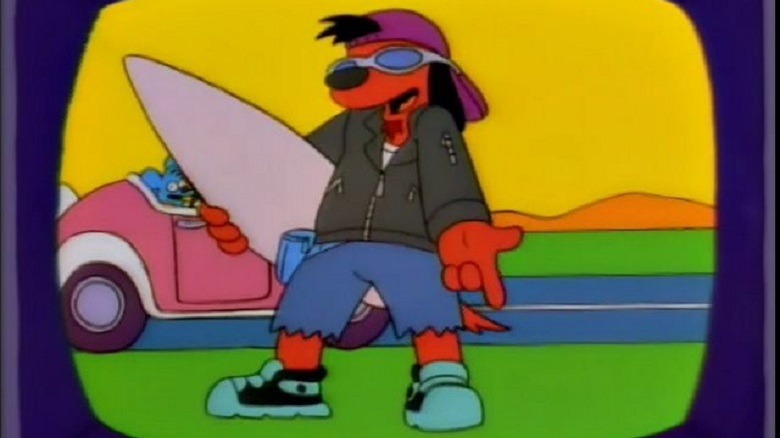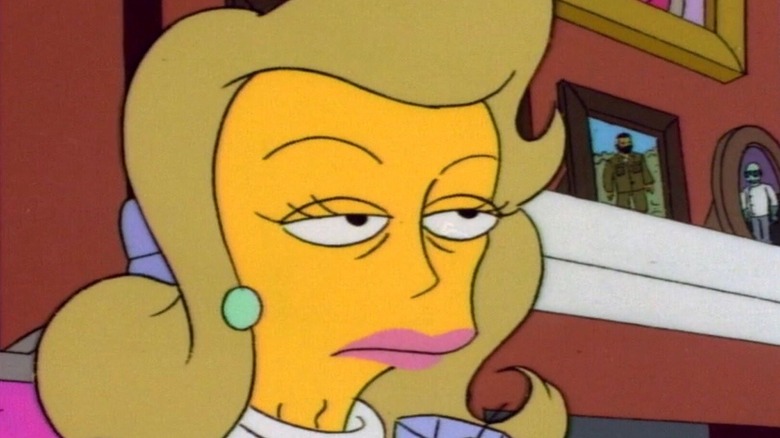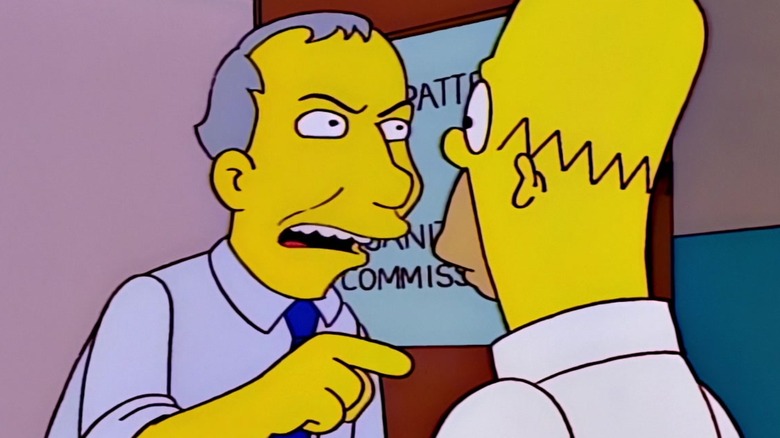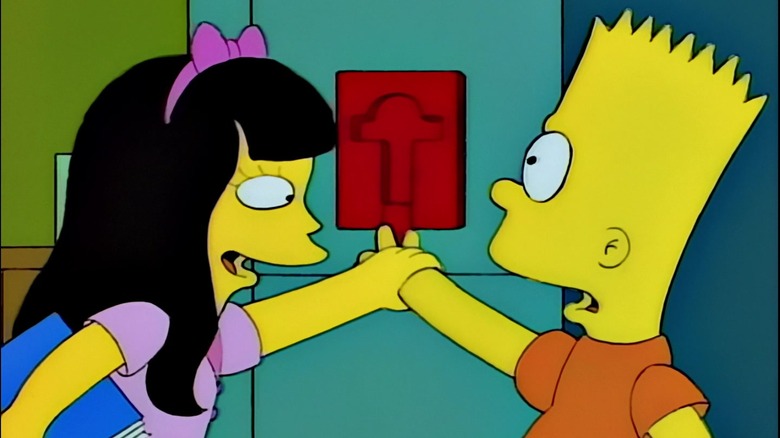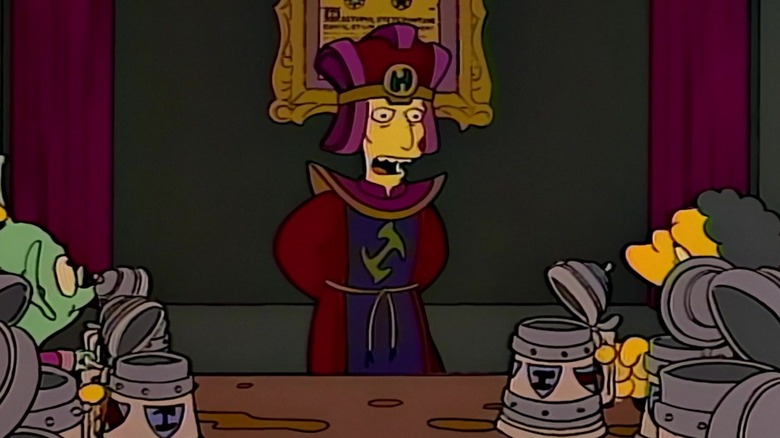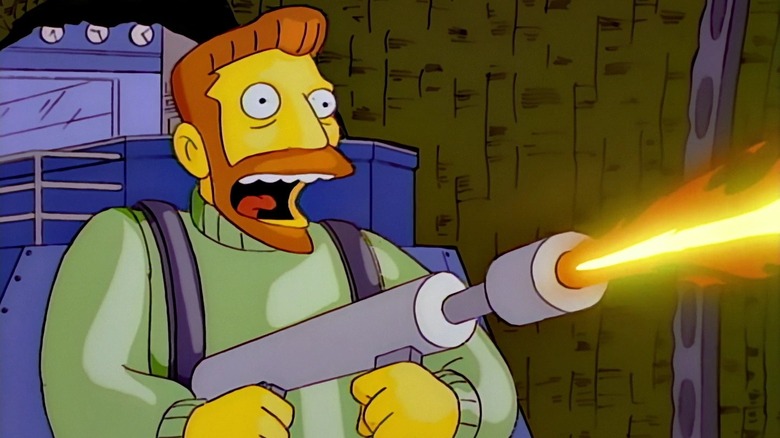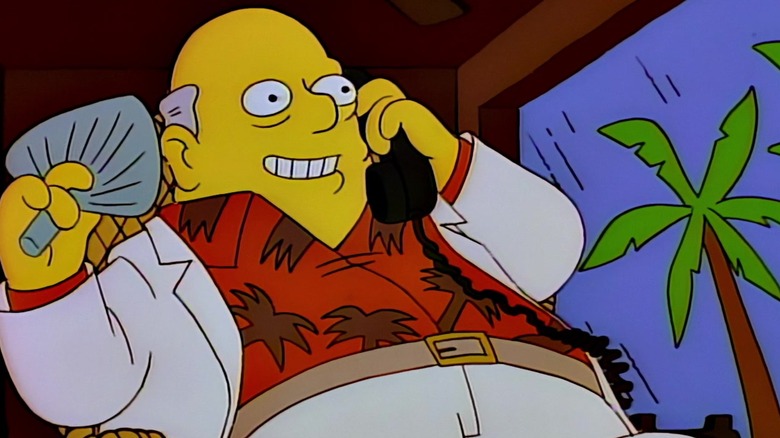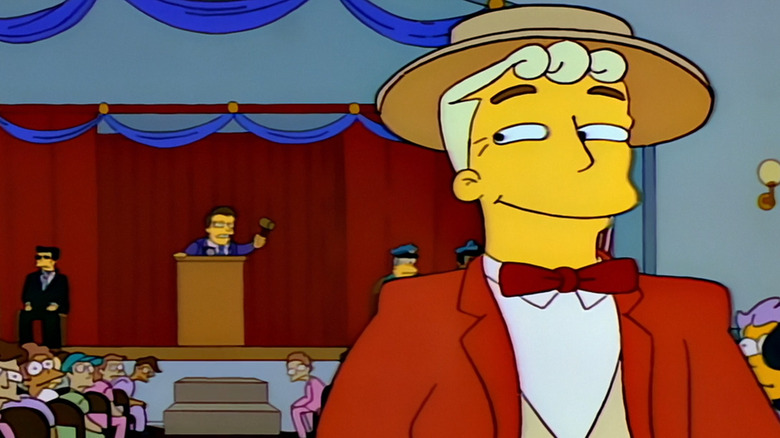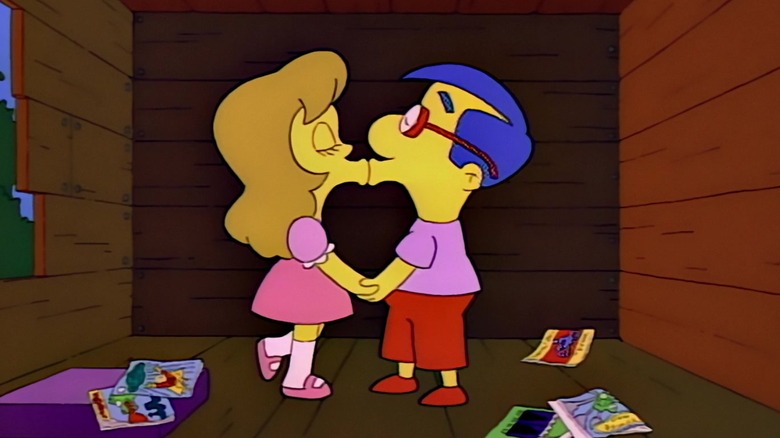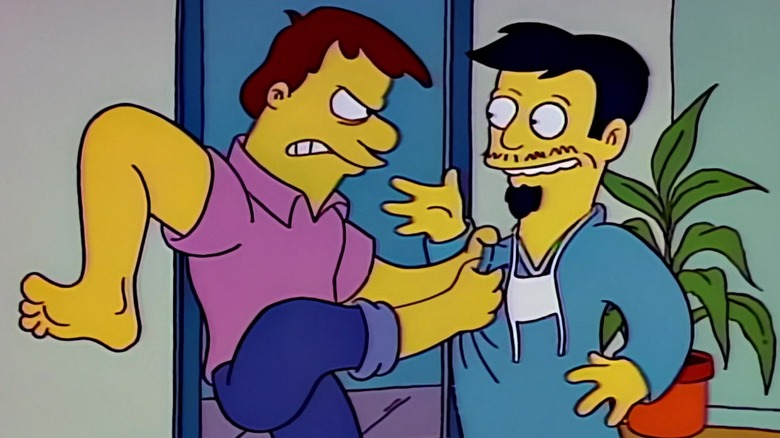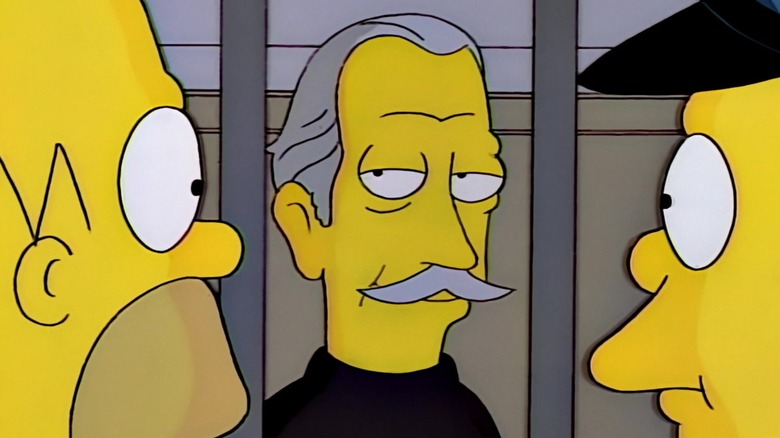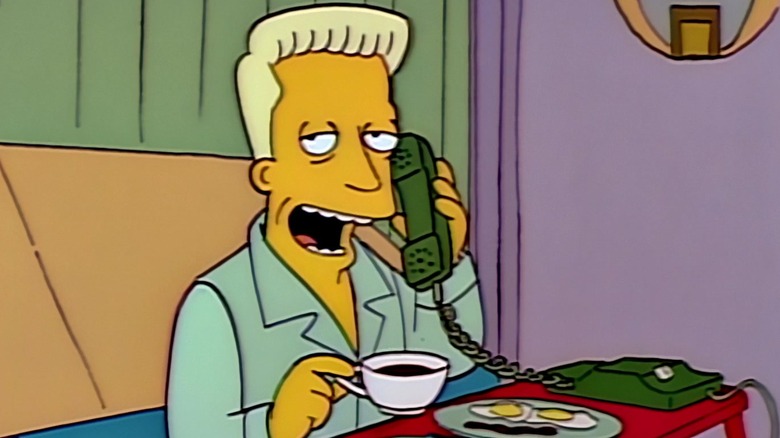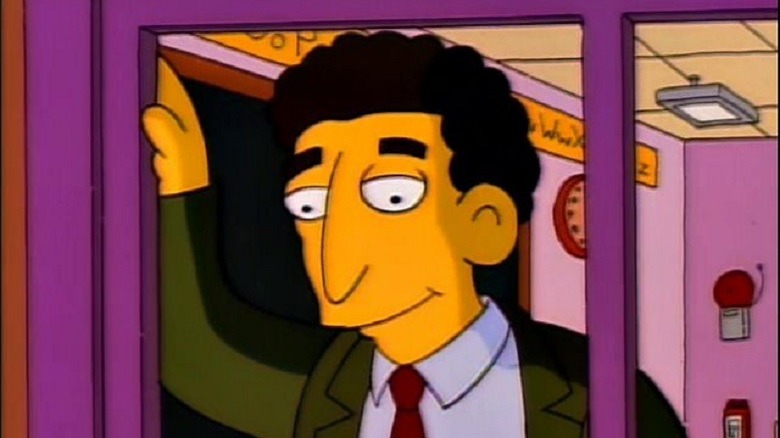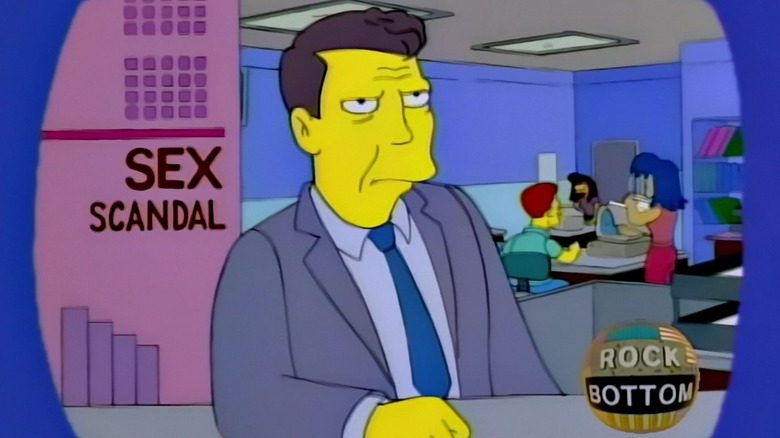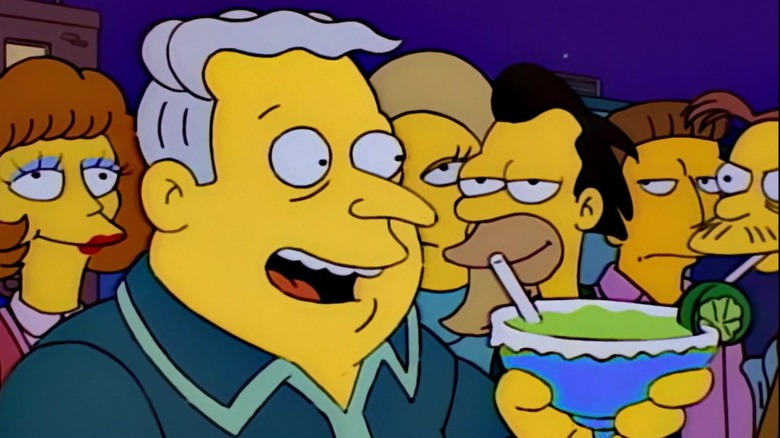The 27 Best Simpsons One-Off Characters Ranked
After 32 years on the air, it takes real mettle to appear in only one episode of "The Simpsons" and leave such an impression that the audience never forgets you. And yet, some characters make such a grand contribution to the series or provoke such a change in one of our beloved regulars that a single adventure is all we needed to see. In that spirit, we salute those magnificent one-timers who, even with their brief screen time, made an indelible mark on the greatest television show of all time.
But first, a few honorable mentions! Hats off to Frank Grimes, Birch Barlow, Homer's college nerd buddies, and Spider-Pig. Sadly, all of these characters had significant speaking roles (or, in Plopper's case, oinking appearances) after their debut episodes. That said, Homer's famously uptight adversary, a Rush Limbaugh send-up, a trio of geeky tutors, and one porcine powerhouse are all worthy of recognition. Despite later drop-ins, each made their name in a single episode, earning their place in the "Simpsons" pantheon.
27. Quilloughby (Benedict Cumberbatch) — Panic on the Streets of Springfield
Quilloughby, a thinly-veiled parody of the famously prickly singer Morrissey, is more than worthy of a mention. The usually distinctive Benedict Cumberbatch disappears into the role, giving the cynical warbler a wry tone and floppy disdain that makes him a noteworthy creation. Likewise, the show's animation team gives Quilloughby a specific gait, one that's wispier and more fluid than the average Spingfieldian's, to convey a certain affectedness in the singer (the writers give him a great tune to boot).
More to the point, Quilloughby provokes an epiphany in Lisa. She's initially drawn to the sardonic worldview of her idol-turned-imaginary-friend, giving into his barb-spitting approach. However, Lisa recants when she sees how negativity poisoned his real-life counterpart 30 years later. Lisa's realization is relatable to young fans, who often have similar awakenings when they learn more about the cultural icons they admire. The satire in "Panic on the Streets of Springfield" drew enough blood that the real Morrissey barked back, a sign of the character's late-breaking success.
26. Chester J. Lampwick (Kirk Douglas) — The Day the Violence Died
There's a delightful matter-of-factness to the unheralded creator of "Itchy and Scratchy." Whether he's insisting that a major cartoon studio pay him billions of dollars in compensation or is simply preparing to sleep in a radon-filled basement, Chester J. Lampwick takes it all in stride (that is, unless you serve him substandard baked goods in exchange for his handiwork; then he's spoiling for a fight).
Only the legendary Kirk Douglas could make such a wonderfully out-there character work. Regardless of the bumps in the road of his rags to riches story, Lampwick maintains an even keel, and Douglas' stern steadiness breathes life into the latest miscreant to shack up with the Simpson family.
A big part of what makes ol' Chester stand out, however, isn't just his rocket car or his solid gold house (though he's not too far removed from the streets to give up offering passersby a shoeshine). It's that he represents overlooked or under-compensated creators everywhere, a phenomenon that persists to this day. Lampwick's grumpy triumph (and payday) are inspirational in that fractured "Simpsons" sort of way.
25. Vicki Valentine (Tress MacNeille) — Last Tap Dance in Springfield
We're ever-so-pleased to mention Little Vicki Valentine. When Lisa wants to become a dancer, Marge takes her to a studio run by this amusing pastiche of classic child stars like Shirley Temple. Only now, Vicki's all grown up and ready to mix saccharine Tinseltown smiles with stage mom-esque jabs and unhelpful comments.
The character's a treat in both her youthful form (dancing to save her cat in one of her classic childhood romps) and as the washed-up, chipper-but-useless dance teacher in the here and now. Sadly, all she has to offer by way of real instruction are those three immortal words: tappa tappa tappa.
When Lisa's less than a natural on the stage, Miss Vicki demotes the young Simpson to curtain-puller and takes the recital's lead role, stealing the spotlight from her eight-year-old pupils. It's a cold move, one made all the more entertaining by Vicki's sunniness amid each put-down. Voice actor extraordinaire Tress MacNeille finds the venom behind the one-time movie moppet's mirth, making the trying tap-teacher one to remember.
24. Roy (Hank Azaria) — The Itchy & Scratchy & Poochie Show
There's not much to Roy. He utters about four lines, injects a bit of faux-hip slang, and then is quickly off on his own unseen adventures with "two sexy ladies." But the barrenness of Roy's empty personality is the point. He's a pitch-perfect parody of how long-running shows inject a dose of the superficially new and cool into the series, often in bizarre, almost surreal ways. In fact, Roy makes his first appearance in "The Itchy & Scratchy & Poochie Show" right after Lisa proclaims, "Adding a new character is often a desperate attempt to boost low ratings."
Cut to the man himself, a never-before-seen addition to 742 Evergreen Terrace who refers to Homer as "Mr. S" (a la the Fonz) and has the same backward hat and sunglasses as a newly-unveiled cartoon dog. His completely unexplained arrival and ever-clichéd responses to the various goings-on at the Simpson household make him an endearing spoof of cheap television ploys.
23. Professor Lombardo (Jon Lovitz) — Brush with Greatness
Jon Lovitz deserves to be included in any list honoring great "Simpsons" guest performers. The problem is that he puts such fantastic energy into each one of his animated personalities that the show keeps bringing them back! Thank goodness, then, for Professor Lombardo, Marge's art teacher from "Brush with Greatness," a one-timer who nevertheless shows off Lovitz's prodigious talents.
Professor Lombardo is a doggedly encouraging gentleman. Despite Marge's reluctance about her artistic talents, he recognizes his student's gift for seeing her subjects' inner beauty. But Lombardo's compliments aren't limited to the artistry of one blue-bouffant homemaker. He declares even the output of a workman painting a sign in the hallway as "another triumph" (ironically, he doesn't take praise very well himself).
Lombardo's pip and good cheer give Marge the boost she needs to follow her dreams. As a reflexively supportive instructor in an otherwise harsh business, bolstered by Lovitz's usual panache, the positive professor makes for a great entry in the long-running and fruitful history of Lovitz-"Simpsons" collaborations.
22. Shary Bobbins (Maggie Roswell) — Simpsoncalifragilisticexpiala(Annoyed Grunt)cious
Does an obvious Mary Poppins parody belong here? Yes, when she's as practically perfect as this one. For her part, Shary downplays her resemblance to a certain other magical nanny, declaring that she's an original creation, just like "Rickey Rouse" and "Monald Muck".
It's Shary's differences from P.L. Travers' classic character, however, that make her so hilarious. Shary Bobbins may be a send-up, but there's something just a little cracked lurking beneath her cheery demeanor. While Mary sings about making chores fun, Shary simply encourages her young wards to do a "half-assed job."
While Mary heals the dysfunctional family that hires her, Shary's charms fall woefully short for the Simpson brood. And while Mary leaves the Banks household in the throes of a job well done, Shary inevitably bails on our favorite family upon realizing they're "all a bunch of apes."
Shary's cynical spin on a spritely classic shows how the crude, slovenly Simpsons are enough to break even the brightest and most magical of spirits, which makes her one-off appearance a definite winner.
21. Mr. Black (Harry Shearer) — Kamp Krusty
Maya Angelou tells us that when people show you who they are, believe them. In "Kamp Krusty," Mr. Black not only shows us who he is, he tells us. He's the former Euro Krustyland president, who oversaw its 15-year demise before it blew up, likely with a nice insurance payout. Now Krusty has hired Mr. Black to cut corners at Kamp Krusty.
Mr. Black built the children's camp at an abandoned mule tannery that sits underneath Mount Avalanche. The children are fed imitation gruel and forced to make knockoff Gucci purses that need to be on the streets of Hong Kong by Friday. As Lisa tells her mom in a letter home, "I no longer fear Hell because I've been to Kamp Krusty."
Mr. Black is an efficient cost-cutter, but he's also cruel. He hires bullies to break the kids' spirits. Then, toasts the bullies with cigars and brandy saying, "Gentlemen, to evil." Mr. Black shows us and tells us who he is and that helps show us who Krusty is. After learning of the hardships the kids face, Krusty takes the kids to Tijuana for the time of their lives.
Despite Krusty's apology and reparations, Mr. Black's camp has traumatized the kids. 25 years after "Kamp Krusty" aired, a new episode ("Kamp Krustier") shows Bart having post-camp nightmares. The kids return to confront their trauma but never confront Mr. Black because he apparently sped off to anonymity on his hydrofoil. So evil.
20. The Great Raymondo (Martin Landau) — The Great Simpsina
Maybe it's just the appeal of Martin Landau playing another wistful former star fallen on tough times (hello fellow "Ed Wood" fans!), but his turn as washed-up magician, the Great Raymondo, is a late-season gem for "The Simpsons".
Raymondo becomes an unlikely mentor to Lisa when she develops an interest in magic. He goes so far as to teach her his signature trick. But the two have to find equilibrium again after Lisa accidentally gives the secret away to Raymondo's young rival.
Landau handles the character's sardonic humor and amusing pessimism about the magic business perfectly, but he also masters the soft undercurrent of emotion at the character's heart. There's a gentle melancholy to the old trick master, who still harbors regrets about his deceased wife-slash-assistant, his failed career, and the places where the two intersect.
A line like "the only magic we couldn't make is a child" may be heavy for a comedy show, but it informs his bond with Lisa, and it makes both "The Great Simpsina" and Raymondo himself one of the underrated successes of the show's later run.
19. Rex Banner (Dave Thomas) — Homer vs. the Eighteenth Amendment
Contrary to his no-nonsense demeanor, Rex Banner gave viewers of "Homer vs. the Eighteenth Amendment" plenty of reason to ckk-ghh-shkk-hrrng: Well, you all know what laughter sounds like. A superbly crafted performance from "SCTV" talent Dave Thomas made Springfield's new police chief the perfect antithesis to Homer "Beer Baron" Simpson.
A big part of what makes the character so enjoyable is that, despite seeming to be one of the few competent professionals in Springfield, he's no more successful at stopping the town's bootlegging than the usual crop of bumblers. That Banner's outwitted by the likes of Moe (owner of the dubiously-proclaimed "best pet shop in town") and the doltish Homer only adds to the humor.
The hard-boiled, prohibition-era copper, out to get Homer's amusingly inept Beer Baron, makes for a hilariously strait-laced new element to mix in with the typical looney lot of "The Simpsons."
18. Space Coyote (Johnny Cash) — El Viaje Misterioso de Nuestro Jomer
Hey, if you could get life advice from a whimsical desert critter with the gritty baritone of Johnny Cash, you too might gulp down some Guatemalan insanity peppers. So many things stand out about the famed Space Coyote from Homer's capsaicin-induced hallucination. The easiest of them, though, is Cash's trademark rumbling timbre. The Man in Black wasn't a voice actor by trade, of course, but he adds instant, weather-worn gravitas to the spirit guide's wisdom.
Still, the unique design of Homer's mystical friend warrants mentions as well. There's a Cheshire Cat quality to the coyote's entrance and an angular, ethereal look to him that makes the desert coyote as visually striking as he is vocally arresting.
His presence finds the right balance between profundity (encouraging Homer to find his soulmate) and humor (gnawing at Homer's leg because, well, he's still a coyote). Put it all together, and you have one of the most unique and enjoyable guest appearances on "The Simpsons," even if he can't give you any new information.
17. Bea Simmons (Audrey Meadows) — Old Money
Two senior citizens having their pills mixed up at the retirement home isn't your traditional meet-cute, but Grampa's short-lived yet irrepressibly sweet romance with Bea Simmons was an early "Simpsons" highlight. The kind and caring Bea renewed the old coot's lust for life, and the montage of the pair's courtship set to "Embraceable You" is wholesome as heck.
What makes Bea so memorable, though, is how she inspired Abe even after her death. Coming back as a ghost (a rarity outside of "Treehouse of Horror") certainly makes that a little easier. Still, supernatural advantages aside, Bea also bequeaths Abe a good chunk of change and inspires him to use it to spice up the lives of his fellow seniors.
Like so many great guest characters, Bea walks the line between comedy (explaining that she's haunting a family in Texas) and heart (encouraging Abe to reconcile with Homer). But her sincere connection with Grampa and her meaningful presence in his life, even after her death, gives her a legacy for both Grampa and "The Simpsons".
16. John (John Waters) — Homer's Phobia
John is the best kind of one-off Simpsons character; he can ZAP an entirely new belief system into someone in just 22 minutes (and dispel the notion of grooming years before it became a social narrative). In "Homer's Phobia," John winks at the audience about how antiquated and tragically ludicrous the Simpsons are, but you can tell he genuinely cares for them.
Of course, Homer being Homer, he calls John a sneak because he's not a flaaaaaaming homosexual. Homer feels that his antiquated ideals are being challenged. He confronts John for embarrassing him and America and for turning names like Lance and Julian from tough to queer. John stays cool despite Homer's attitude. You can tell John has had this conversation many times before.
Homer responds in typical Homer fashion. He wants Bart to kill a reindeer so Bart can grow up straight for once. Luckily, when Bart, Homer, and a couple of other Springfieldians are in danger, John saves the day. Homer is transformed from fearmonger to advocate in minutes and demands his friends call John a fruit.
Because of John's positive influence, Homer even tells Bart any way he chooses to live his life is okay by him. Bart: Huh? Lisa: He thinks you're gay. Duh duh duh duh duh duh 🎶Everybody dance now!🎶
15. Poochie (Dan Castellaneta) — The Itchy & Scratchy & Poochie Show
Look, this is cheating a bit. Roy already represents this episode with aplomb on this list and, technically, Poochie does have a single line in a subsequent cameo. But this "rockin' dog" is such a perfect symbol of embarrassing, group-think'd efforts to be cool in kids' entertainment that his inclusion here simply cannot be denied.
Whether it's Poochie's hilariously bad rap, the urge to "rasta-fy him by ten percent or so," or his uproariously funny postscript post-mortem on the way to his home planet, Poochie represents everything absurd and misguided about corporate boardroom attempts to generate something hip.
The proactive pooch, voiced by Homer's voice actor, Dan Castellaneta, was the writers' response to real-life executives who encouraged them to introduce a new character to "The Simpsons." Not only is Poochie's mere existence as a Frankenstein's monster of youth clichés hysterical, but his status as a living, skateboarding, rapping jab at studio interference makes him an instant classic.
14. Stacy Lovell (Kathleen Turner) — Lisa vs. Malibu Stacy
When Lisa goes on a crusade against the sexism of dolls sold to little girls, she decides to take her complaint all the way to the creator of Malibu Stacy herself. Stacy Lovell's whiskey-soaked cynicism serves as a perfect foil to Lisa's agitating enthusiasm. They are the perfect pair to try to bring the ersatz Barbie doll into the modern age.
Kathleen Turner is brilliant in the aptly titled "Lisa vs. Malibu Stacy." Her dry, sarcastic tone is a godsend, made all the more potent by Turner's grave tenor. And the episode smartly balances her status as a bitter, pushed-out creator while also making her the literal embodiment of Malibu Stacy and her dream world.
Whether she's reflecting on her five marriages, angrily informing the Simpsons that they all have "hideous hair," or mumbling about funneling profits to the Viet Cong, every line out of Stacy's mouth is a hoot, which is more than what be said for the doll that bears her name.
13. Ray Patterson (Steve Martin) — Trash of the Titans
Ray Patterson doesn't belong in "The Simpsons" universe. He's reasonable. He's responsible. He's a nice guy. That doesn't float in Springfield, especially when you've become the arch nemesis of Homer Simpson, a man so callous that instead of apologizing to sanitation workers, he allows garbage to accumulate to a point that a crazy woman now calls it home and Bart has the plague.
Ray Patterson is an efficient sanitation manager, but he's not equipped to stand against the whims of Springfieldians. He's also too level-headed to help clean up Homer's inevitable mess. Simpsons shows are often teetering between grounded stories with real issues and out-of-this-world adventures (Roger Meyers Jr. knows what I'm talking about). In "Trash of the Titans," we see this struggle play out. Ray Patterson is grounded in reality, which is why garbage collection hasn't been an issue in Springfield before.
Homer Simpson exists in a fantasy world and devises a fanciful plan to make someone else do it. In the end, Homer wins, and after a few months, the city is forced to enact Plan B, which means moving Springfield five miles down the road.
Every once in a while, "The Simpsons" veers away from reality. It's a smart move by the writers to insert a grounded character like Ray as it measures how far out there the show has gotten. They can then pull back next week to steady the course.
12. Jessica Lovejoy (Meryl Streep) — Bart's Girlfriend
"I'm the sweet, perfect minister's daughter, and you're just yellow trash." Every great villain has a reason they do bad things. Jessica Lovejoy, voiced by Meryl Streep, doesn't care how many glee club members she punches, toilets she blows up, or collection plates she steals to get the attention of her dad. Yet, when reminded of her violent cries for attention, Reverend Lovejoy just scampers off, singing "Bringing in the Sheaves" to block her out.
What, then, would get under her father's skin to make him pay attention to her? Dating the most troublesome member of his father's flock: Bart Simpson. Jessica manipulates Bart, draws him towards herself like a siren, and then parades her relationship in front of her father with complete indifference as to how it impacts Bart. He has no shortage of enemies, but Jessica is the first one to really hurt Bart.
It can be hard to make adult viewers empathize with a 10-year-old, four-fingered cartoon character. Many of us, though, have a Jessica in our lives. Someone who has us asking ourselves, "Is it my hair? My overbite? The fact that I've worn the same clothes day in, day out for the last four years?" Jessica doesn't care about Bart, but we do, and that's why the show has been on the air longer than the relationship between the two.
11. Number One (Patrick Stewart) — Homer the Great
"The Simpsons" is at its best when it is both a harsh reflection of American culture and an outrageous gag fest that has us gleefully singing "We Do" with fellow fans years after an episode first aired. The head of The Stonecutters, Number One, reflects that dual nature.
He is a stern leader who seeks to split the rocks of ignorance that obscure the light of knowledge and truth while also overseeing weekly beer busts, beer blasts, and keggers. He may be the most powerful man in Springfield as he is able to keep Martians under wraps and hold back the electric car, but he's putting some saucy ribs on your plate while you're celebrating the society's 1,500th anniversary.
Even when Number One reveals that Homer is prophesied to bring the Stonecutters to glory, he dutifully removes the Stone of Shame and follows protocol by attaching the Stone of Triumph. His sense of duty is unshakeable until Homer cancels his drinking events to host charity events.
Number One cannot tolerate that, and with the approval of the World Council (made up of Orville Redenbacher, Jack Nicholson, Mr. T, and George H. W. Bush), he oversees the first meeting of the ancient mystic society of "No Homers." He's a by-the-books leader who shows he is not afraid to throw out those centuries-old books and write his own new chapter when the rules get in the way of hoisting foamy steins. Cheers to that!
10. Hank Scorpio (Albert Brooks) — You Only Move Twice
The formula for Hank Scorpio is deceptively simple: Combine one part Bond villain and two parts friendly Silicon Valley boss. The basic twist of the character's landmark appearance in "You Only Move Twice" is that this genial, genuinely nurturing company CEO is, in fact, a Blofeld-esque criminal mastermind poised to seize the East Coast. The comic distance between the friendly manager and the globe-threatening megalomaniac makes Mr. Scorpio a superbly-conceived character.
But what puts him over the top is the way Albert Brooks, one of the all-time most reliable guest stars on "The Simpsons," takes the character and makes him his own. It's not just Brooks' improvisations, including his famous riff on the hammock district, but the chipper, indefatigable attitude that Brooks injects into every line.
The great rapport between Hank and Homer adds to the comedy and makes it extra melancholy when Homer has to bid farewell to the criminal enterprise he's oblivious to. Only a performer like Brooks could sew the two disparate parts of Hank Scorpio into a single, back-patting, France-destroying dynamo of a boss.
9. Cayman Islands banker (Hank Azaria) — Bart the Fink
You don't get more one-offs than having a few lines and no name. Even Mr. McGreg has a name. In "Bart the Fink," we can tell a lot about the Cayman Islands banker based on his short appearance. Bart sends Krusty the Clown a check, knowing his comedic idol will sign it, and in doing so, Bart will get his autograph. Unfortunately for Bart, his trick will also end Krusty's career...for about 16 minutes. When Bart confronts the bank about why Krusty uses a stamp instead of a signature, he sets off a series of investigations that lead us to the Cayman Islands banker.
The banker lives a luxurious life. He has a beachside home in the Caribbean. He's dressed in a fine, white linen suit. Wearing the suit, though, without air conditioning is not his best move. When he's contacted about Krusty's account, he says, "Oh ho ho. I'm sorry, I cannot divulge information about that customer's secret, illegal account." He realizes the mistake he made and says, "Ahh. It's too hot today," then settles back into his chair without any further action.
His reaction shows me Krusty's downfall will cost him some money, but he's going to be fine, either because of jurisdiction or his team of lawyers. Either way, his gaffe clearly cost him a sizable sum of money. Maybe it's time to invest in some AC. I'm sure he has a secret, illegal account somewhere he can tap into.
8. Lyle Lanley (Phil Hartman) — Marge vs. the Monorail
What did audiences in 1993 demand from their animated sitcoms? Why, extended riffs on public transportation and spoofs of "The Music Man," of course. Enter Lyle Lanley, a parody of Harold Hill who pops into Springfield to sell the gullible townsfolk a genuine, bona fide, electrified, six-car monorail.
National treasure Phil Hartman assumes the role with his usual gusto, breathing life into a superb script by a pre-fame Conan O'Brien. Hartman had an uncanny ability to take outsized characters, make them oddly plausible, and turn almost every line into laughter. His conman-turned-showman sweeps the Simpsons, their town, and the audience off their feet, and rightfully so.
Lanley's performance of the all-time classic monorail song, his patient humoring of the sheep-like denizens of Springfield, and his subtle panic and menace as the truth of his grift slowly comes to light make the behatted barker a beloved figure far beyond Brockway, Ogdenville, and North Haverbrook.
7. Samantha Stankey (Kimmy Robertson) — Bart's Friend Falls in Love
Springfield and its residents are forever trapped in time. They don't age. They'll never have fur in places where there was no fur before. The young characters will never give in to their throbbing biological urges. They can't because the weekly story arc, character arc, and moral compass all need to reset. That's where someone like Samantha Stinky is useful. Sorry, Stankey. How embarrassing for you.
The young Miss Stankey is a story tool used to explore what could come between two best buddies: Bart and Millhouse. Bart's innocence needs to remain fully formed for the series to properly reset at the end of the episode. Millhouse's innocence, though, gets to melt just a little bit, and why wouldn't it? Samantha is a sweet kid. She makes Millhouse happy, which he rarely is. She brings a little vigor out of him, inspiring him to fight his best friend for ratting them out.
Samantha does something that's not always easy: She makes us like Millhouse. If she's willing to risk 50 rosaries for one last smooch, maybe there's more to Millhouse than meets the eye. In the end, Millhouse asks Bart if he'll ever see another like her. Bart answers, "You're asking the wrong guy, Millhouse. They all look alike to me." Friendships explored. Character grown. Innocence preserved. Samantha Stankey gets an A, and not just on grammar and poise.
6. Mr. McGreg (Hank Azaria) — Homer's Triple Bypass
Mr. McGreg has almost no screen time, but his appearance says a lot about one of the most misunderstood characters on "The Simpsons." Dr. Nick Riviera gives off the appearance of being aloof. In the episode "Homer's Triple Bypass," he even advertises, "You've tried the rest; now try the best." He's just not good at what he does, right? Wrong.
Incompetence is a guise worn by a sociopath who relishes the damage he causes to patients. He's the kind of person who enjoys being chased by members of the press who are screaming, "Where are the bodies?" It's no more apparent than when Mr. McGreg confronts Dr. Nick.
After the maligned surgeon successfully tinkers with Homer's ticker, Mr. McGreg grabs the surgeon, saying, "Doctor Nick, remember me?" Instead of jumping out of a window, Dr. Nick smiles and almost sneers at his former patient, teasing him with the rhyme, "Well, if it isn't my old friend Mr. McGreg, with a leg for an arm and an arm for a leg."
Cold-blooded. What stands out is the level of competence shown by Dr. Nick: His ability to reattach a hand to a leg that's functional enough to grab the surgeon's scrubs. Then Dr. Nick serenades him with a rhyme that's been memorized explicitly for this moment. That is some calculated cruelty. People of Springfield, be careful calling 1-600-DOCTORB: You could be at the mercy of a deranged but expert surgeon.
5. Molloy (Sam Neill) — Homer the Vigilante
Sometimes we need a reminder of what we cherish the most, be it a saxophone, family heirloom, Shroud of Turin beach towels, or the people we care about. In "Homer the Vigilante," cat burglar Molloy targets Springfieldians' most precious objects, though it's unclear why.
He may enjoy the thrill of the burgle, he may want people to realize how much they cherish their possessions, or he may want to stir Springfield into a fury, which is never difficult. It's most likely, though, that Molloy wants to give one of his fellow retirement home dwellers a little recognition.
In response to the thefts, Homer Simpson rounds up a drunken posse armed with guns, tire irons, and sacks of doorknobs minus the knobs. The cat burglar (Molloy) tells the posse his plan to steal Springfield's pride of joy, the world's large cubic zirconia. Molloy pinches the rare stone when Homer is passed out, prompting the people of Springfield to bombard Homer with rotten fruit.
Grandpa saves his son, then reveals that he noticed Molloy in sneaking shoes, grappling the side of the museum, and using a large cubic zirconia as a coffee table. Molloy is arrested, apologizes, and returns all possessions. Homer tells the crowd he's proud of his dad: A small moment in the show, but likely Molloy's real goal. After all, he's an old crook who Grandpa shows kindness to by lending his ointment, even though Molloy never cleans off the applicator.
4. Karl (Harvey Fierstein) — Simpson and Delilah
We wish we had a Karl in our lives. Someone to help us organize our thoughts for a big presentation. Someone who tells me to let out my gut, then tells my tailor to hide it. Karl is the kind of character in "The Simpsons" who helps us see the potential of Homer J. Simpsoid, er, Simpson.
In "Simpsons and Delilah," Homer is transformed. Dimoxinil has given Homer his hair back, turning him into a "young go-getter" who is "more dynamic and resourceful." More importantly, Mr. Burns now sees Homer as an unspoiled lump of clay with executive potential. His promotion comes with a personal assistant. Enter Karl.
Harvey Fierstein brings Karl to life. When he tells Homer, "My mother taught me never to kiss a fool," we believe him. There's something different fueling the fire inside Karl. When pressed by Smithers about why he's helping Homer, Karl tells him, "My reasons are my own." Later, he drops a clue, telling Homer, "You are one of Springfield's very special creatures." This is a character who, like Marge, sees beyond the outwardly apparent limitations of Homer and champions him as we fans have for decades.
3. Mr. Bergstrom (Dustin Hoffman) — Lisa's Substitute
It took an Oscar winner's silly-but-sincere take on Lisa's unorthodox substitute teacher to give "The Simpsons" one of its first and most moving emotional moments. Most of us remember that mentor who reached us, who inspired us to look at the world differently, and who taught us to see the potential inside of ourselves. For Lisa, that was Mr. Bergstrom.
Mr. Bergstrom is believable both in his freewheeling tutelage and in his moments of genuine connection with a very special student and misfit. It's no secret that Lisa doesn't exactly have the greatest male role model at home. But, for one glorious stretch of days in "Lisa's Substitute," she had an off-kilter but endearing example in someone who's intellectual but fun, and smart but irreverent.
Until he had to say goodbye. There are few more powerful moments in "The Simpsons" than Mr. Bergstrom's inevitable departure, accompanied by his reassurances that all that his precocious pupil needs to remember is "You are Lisa Simpson." His presence livened, challenged, and ultimately enriched the life of little Lisa.
2. Godfrey Jones (Harry Shearer) — Homer Badman
"This is God...frey Jones,": It's a perfectly misleading introduction to a yellow journalist who preys on innocent people (except Willie: He's evil, listen to the music!). Godfrey hosts the show "Rock Bottom," which is a clear reference to '90s tabloid TV. Homer is accused of sexually harassing a babysitter while peeling a Venus de Milo gummy from her butt. There are more respectful ways to extract a prized gummy from a woman's posterior, but Homer didn't deserve the torment caused by Jones.
The programs that "Rock Bottom" satires were the clickbait of the '90s that aired embellished stories to alarm and stun viewers. Godfrey Jones takes it to another level. His interview with Homer makes it seem like Homer's a drooling pervert and a danger to society. The fake news story sends Homer on a downward spiral, inspiring estranged mothers and daughters to reunite on TV over their hatred of him, and even Hollywood takes a shot, casting Dennis Franz in "Homer S.: Portrait of an Ass-Grabber."
Jones is forced to retract his story about Homer, though the damage is already done. It's reminiscent of recent political cycles where fake stories tear down opponents' campaigns even after they're proven to be untrue. To be fair to Jones, he didn't act alone. When "Rock Bottom" turned their focus onto Willie, a brilliant but cruel person in the graphics department came up with "Rowdy Roddy Peeper," which makes for possibly the funniest "Simpsons" episode ever.
1. Larry Burns (Rodney Dangerfield) — Burns, Baby Burns
You can tell Larry Burns is a dream character for the writers, though not because of the character itself. Rodney Dangerfield voices the long-lost son of C. Montgomery Burns. On the season eight DVD commentary, writers say Dangerfield was one of their favorite comedians and actors and was a top choice to have guest star on the show. They even tried to write his style of jokes, but Dangerfield changed a few in the recording booth.
In "Burns, Baby Burns," Homer immediately finds a soulmate in Larry, as both are blue-collar boozehounds. The Simpsons kids also appreciate his constant roasting of people around him. Some characters, including Larry's dad, quickly tire of his act, which I understand as a viewer. This is not Dangerfield in his top form: Mr. Burns has the most scorching roast of the episode, telling Larry, "You're the only one stupid enough to kidnap you," but Larry effectively moves Mr. Burns along his character arc.
Larry asks Mr. Burns if he can love him for who he is. In the end, Mr. Burns does accept Larry: He's seen dancing and drinking after a block party pops up out of nowhere. Real-world personalities don't always translate to two-dimensional Springfield, but through Larry, we get a character who serves his role, and we get a taste of a comedy icon, though his best material needs to be Googled after you watch the episode.
